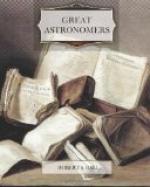His somewhat discursive studies had, however, now to give place to a more definite course of reading in preparation for entrance to the University of Dublin. The tutor under whom he entered, Charles Boyton, was himself a distinguished man, but he frankly told the young William that he could be of little use to him as a tutor, for his pupil was quite as fit to be his tutor. Eliza Hamilton, by whom this is recorded, adds, “But there is one thing which Boyton would promise to be to him, and that was a friend; and that one proof he would give of this should be that, if ever he saw William beginning to be upset by the sensation he would excite, and the notice he would attract, he would tell him of it.” At the beginning of his college career he distanced all his competitors in every intellectual pursuit. At his first term examination in the University he was first in Classics and first in Mathematics, while he received the Chancellor’s prize for a poem on the Ionian Islands, and another for his poem on Eustace de St. Pierre.
There is abundant testimony that Hamilton had “a heart for friendship formed.” Among the warmest of the friends whom he made in these early days was the gifted Maria Edgeworth, who writes to her sister about “young Mr. Hamilton, an admirable Crichton of eighteen, a real prodigy of talents, who Dr. Brinkley says may be a second Newton, quiet, gentle, and simple.” His sister Eliza, to whom he was affectionately attached, writes to him in 1824:—
“I had been drawing pictures of you in my mind in your study at Cumberland Street with ‘Xenophon,’ &c., on the table, and you, with your most awfully sublime face of thought, now sitting down, and now walking about, at times rubbing your hands with an air of satisfaction, and at times bursting forth into some very heroical strain of poetry in an unknown language, and in your own internal solemn ventriloquist-like voice, when you address yourself to the silence and solitude of your own room, and indeed, at times, even when your mysterious poetical addresses are not quite unheard.”
This letter is quoted because it refers to a circumstance which all who ever met with Hamilton, even in his latest years, will remember. He was endowed with two distinct voices, one a high treble, the other a deep bass, and he alternately employed these voices not only in ordinary conversation, but when he was delivering an address on the profundities of Quaternions to the Royal Irish Academy, or on similar occasions. His friends had long grown so familiar with this peculiarity that they were sometimes rather surprised to find how ludicrous it appeared to strangers.
Hamilton was fortunate in finding, while still at a very early age, a career open before him which was worthy of his talents. He had not ceased to be an undergraduate before he was called to fill an illustrious chair in his university. The circumstances are briefly as follows.




